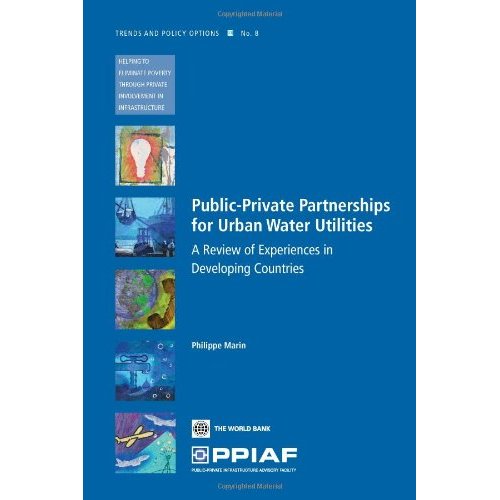Public-private Partnerships for Urban Water Utilities: A Review of Experiences in Developing Countries
 |
Partenariats public-privé pour les services d’eau urbains Bilan des expériences dans les pays en développement
Trends and policy options ; no. 8
livre Jan 2005 ; 208 pages
Aut. Philippe Marin
Ed. PPIAF - Washington World Bank - Washington ; Isbn: 978-0-8213-7956-1
Téléchargeable sous format: PdF
Téléchargeable chez l'éditeur
Résumé:
This study examines the understanding of the performance of public-private partnerships (PPP) projects in urban water utilities in developing countries.
It focuses on projects in which a private operator is introduced to run the utility, consequently excluding build, operate, and transfer (BOT) projects and similar arrangements limited to the construction and operation of treatment facilities.
It reviews the overall spread of urban water PPPs during the past 15 years and seeks to respond to the questions of whether and how they have helped to improve services and to expand access for the populations concerned.
The study analyzes performance data from more than 65 large water PPP projects that have been in place for at least five years (three years in the case of management contracts), a sample that represents a combined population of about 100 million people – close to half of the urban population that has been served by private water operators sometime between 1990 and 2007. This sample represents, by size of population served, close to 80 percent of the water PPP projects that were awarded before 2003 and that have been active for at least three years.
Four dimensions of performance are analyzed: access (coverage expansion), quality of service, operational efficiency, and tariff levels. The analysis focuses on the net improvements and actual impact for the concerned populations, rather than whether contractual targets were met. Based on what worked and what did not, conclusions are then drawn on how governments can better harness private initiative to improve water supply and sanitation services in the developing world.
The key findings are:
* water PPPs are a viable option in developing countries
* the most consistent contribution of private operators has been improved efficiency
* contractual arrangements for water PPPs have evolved differently in different regions.
The findings of this study suggest that a new approach is emerging for maximizing the potential contribution of private water operators in the developing world. The focus of PPP should be on using private operators to improve operational efficiency and quality of service, instead of primarily trying to attract private financing.
Mot clef: |
Editeurs/Diffuseurs: |
|
PPIAF
-
Public-Private Infrastructure Advisory Facility - Washington - Etats Unis |
World Bank - Washington - Etats Unis |
En cas de lien brisé, nous le mentionner à communication@pseau.org